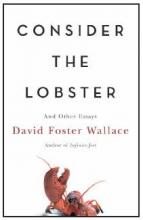David Foster Wallace - Consider the Lobster and Other Essays

I hadn't read David Foster Wallace before this book. I think that I don't like his writing style and disagree with many of his opinions, but he chooses very interesting topics to write about, so I enjoyed reading the book nonetheless.
I care about my writing being clear, and I think that I have a better grasp of grammar / writing style than many others, but most of what I have learned was either picked up organically from reading a bunch of novels or came from Google searches about the proper way to write. As helpful as Grammar Girl and Purdue's Online Writing Lab have been, I mostly just learned what a clause is and how to use a comma properly (both of which are very important!). Wallace comes from a grammary background and he teaches (taught?) English, so he knows a lot about the subject, and one of the essays was a review of Garner's Modern American Usage, so he spoke about the history of different grammar movements (descriptivists and prescriptivists) in order to describe why Garner's usage guide is so amazing. Wallace's review was comprehensive -- my phone told me that it was an hour and a half long -- and it convinced me to buy the book. It also helped me understand more about grammar (eg, no one really cares about ending a setence with a preposition or starting a sentence with a conjunction).
Ironically, however, I didn't like Wallace's writing style. He does a lot of things that make his sentences harder to read. For instance, he often uses "same" as a pronoun, and he often uses non-standard acronyms. He also uses a lot of big words. I can always figure out what he means, but it takes a little extra time.
The article "Consider the Lobster" is about Wallace's experience reviewing a lobster eating festival, which prompted him to think about the ethics of boiling something alive to eat it. I appreciate that he faces the issue head on rather than just not thinking about it.
His reviews of Kafka and Dostoevsky made me want to read those authors.
One point that he comes upon a number of times is derision of "political correctness." He talks about it as an ineffective strategy for politics and social change in general. I think that Wallace is wrong on the political front because, essentially, he's suggesting that it would be better for progressives to adopt conservative rhetoric, which Lakoff's "Don't Think of the Elephant" establishes is often a bad idea. I think that he's wrong in terms of social change in general because there's plenty of research showing that the way we talk about things affects the way we think (eg, after people take an economics class and are inundated with discussions of selfishness, people are more likely to pocket money that they see someone drop rather than return it to its owner). He also dismisses the issue of people caring about identity politics, which I find strange because much of the rest of his writing readily admits that the way we speak and the way we write is a reflection of our identities. It doesn't seem like much of a leap to go from there to the understanding that other people care about how you speak and that a compassionate person would try to speak in ways that wouldn't harm other people.
Despite disagreements with Wallace, I would recommend the book. If you pick it up, though, beware that the first short story is a bit explicit.



